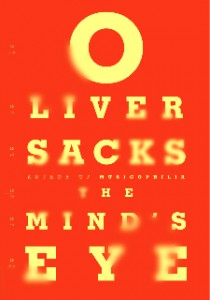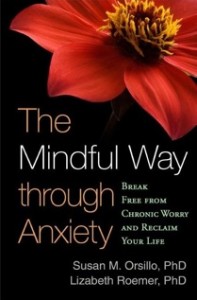The Mind’s Eye
 Latest by writing neuologist, Oliver Sacks is excerpted here, read from/discussed live here. A handful of Sacks’ New Yorker pieces are available in-full here.
Latest by writing neuologist, Oliver Sacks is excerpted here, read from/discussed live here. A handful of Sacks’ New Yorker pieces are available in-full here.
The excerpt begins like this:
Dear Dr. Sacks,
My (very unusual) problem, in one sentence, and in non-medical terms, is: I can’t read. I can’t read music, or anything else. In the ophthalmologist’s office, I can read the individual letters on the eye chart down to the last line. But I cannot read words, and music gives me the same problem. I have struggled with this for years, have been to the best doctors, and no one has been able to help. I would be ever so happy and grateful if you could find the time to see me.
Sincerely yours,
Lilian Kallir
Resilience
On Road to Recovery, Past Adversity Provides a Map (NYT)
New research suggests that resilience may have at least as much to do with how often people have faced adversity in past as it does with who they are — their personality, their genes, for example — or what they’re facing now. That is, the number of life blows a person has taken may affect his or her mental toughness more than any other factor.
Sustainable Love
The latest in relationship science relayed by Tara Parker-Pope.
“People have a fundamental motivation to improve the self and add to who they are as a person,” Dr. Lewandowski says. “If your partner is helping you become a better person, you become happier and more satisfied in the relationship.”
Skin Deep
A study shows people more accurately assessing personality traits of attractive people.
“If people think Jane is beautiful, and she is very organized and somewhat generous, people will see her as more organized and generous than she actually is,” Biesanz said. “Despite this bias, our study shows that people will also correctly discern the relative ordering of Jane’s personality traits – that she is more organized than generous – better than others they find less attractive.”
Study: Video Games Are Good For You
Video Games Boost Brain Power, Multitasking Skills (NPR)
Pratt says playing these video games changes your ability to learn, and to find and integrate new information. “Video game players are able to pick up very subtle, statistical irregularities in environments and use them to their advantage,” Pratt says. “And these same irregularities in environments are the things that help us guide our behaviors on a daily basis.”
On Yawning
Theories about why people–and animals–yawn. One tidbit:
Children under 5 are not subject to contagious yawning, but adult humans, chimpanzees, monkeys and dogs — animals with advanced social skills — are. Apparently an understanding of the mental states of others is required before yawning becomes catching
Mindfulness Exercises
 From The Mindful Way Through Anxiety–or, rather, from the book’s website–some audio mindfulness exercises. (The promo material at the beginning of each ends quickly.)
From The Mindful Way Through Anxiety–or, rather, from the book’s website–some audio mindfulness exercises. (The promo material at the beginning of each ends quickly.)
Narcissism Bites the Dust
NYT: A Fate That Narcissists Will Hate: Being Ignored.
Narcissists, much to the surprise of many experts, are in the process of becoming an endangered species. Not that they face imminent extinction — it’s a fate much worse than that. They will still be around, but they will be ignored. The fifth edition of the Diagnostic and Statistical Manual of Mental Disorders (due out in 2013, and known as DSM-5) has eliminated five of the 10 personality disorders that are listed in the current edition.
Reaction underway: “Odd and haphazard,” says PsychCentral.
Siblings Split
Theories about how siblings develop such different personalities (NPR).
“Children in the same family are more similar than children taken at random from the population,” Plomin says, “but not much more.” In fact, in terms of personality, we are similar to our siblings only about 20 percent of the time.